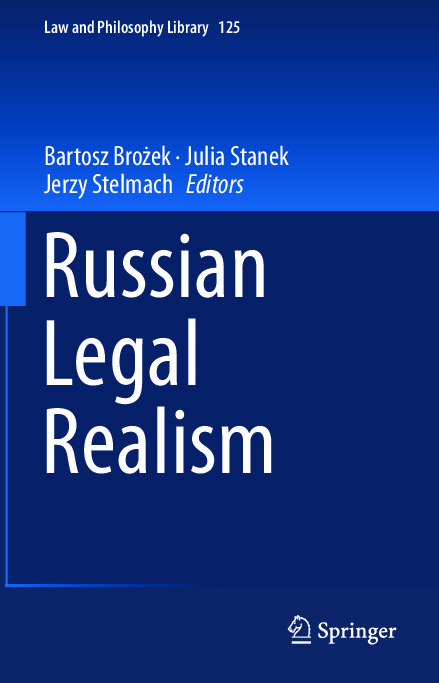File #2541: "2018_Book_RussianLegalRealism.pdf"
Testo
1|Preface|6
1|Contents|12
1|The St. Petersburg School of Legal Philosophy and Russian Legal Thought|13
2|References|43
1|Law and Social Constructivism: The Russian School of the Legal Realism Reexamined|48
2|1 Introduction|48
2|2 The Crisis of Law at the Beginning of the Twentieth Century and the Impact of Legal Realism Theory in Overcoming It|50
2|3 Russian Legal Philosophy: Main Trends at the Beginning of the Twentieth Century|52
2|4 Psychological Theory of Law as a Part of Realist Movement: Similarities and Differences|56
2|5 Critical Theory: Marxist Legal Thought and Realism in the Russian Revolution|60
2|6 The Realist Ingredient in Early Soviet Law: The Evolution of Basic Principles|63
2|7 The Ideological Turnover in Soviet Jurisprudence of 1930s: Why Was Realism Overthrown by Normative Theory?|65
2|8 The Influence of Russian Realism on Legal Sociology in the Twentieth Century|68
2|9 Conclusions: The Role of the Realist Paradigm in the Construction of Social Reality|71
2|References|72
1|The Theory of State and Law by Nikolay Korkunov|77
2|References|88
1|Sergey Muromtsev: The Founder of Russian Sociological Jurisprudence|89
2|References|101
1|On Leon Petrażycki’s Critical Realism and Legal Realism|102
2|1 Introduction|102
2|2 On Petrażycki’s Critical Realism|104
2|3 On Petrażycki’s Legal Realism|106
3|3.1 On Petrażycki’s Realistic Legal Theory|110
3|3.2 On Petrażycki’s Realistic Legal Dogmatics|112
3|3.3 On Petrażycki’s Realistic Legal Policy|115
2|References|117
1|The Logical and Methodological Foundations of the Theory of Law of Leon Petrażycki in the Context of the Analytical-Phenomenological Tradition|119
2|1 Introduction: Formulation of the Problem|119
2|2 The Methodological Foundations of Petrażycki’s Theory of Law: Beyond Metaphysics and Positivism|120
2|3 Petrażycki’s Critique of the Inductive Model for Scientific Theories|122
2|4 Petrażycki’s Conception of Classes and of Class (General) Concepts|123
2|5 Intensional and Extensional Concepts of Class|124
2|6 On the Ontologically Tolerant Conception of Intentional Objects of Franz Brentano, Alexius Meinong, and Edmund Husserl|125
3|6.1 Franz Brentano|125
3|6.2 Alexius Meinong|126
3|6.3 Edmund Husserl|127
2|7 L. Petrażycki and the Analytical-Phenomenological Tradition: Main Conclusions|129
2|8 The Analytical-Phenomenological Tradition and the Ontological Assumptions of Petrażycki’s Law Theory|131
2|9 The Influence of Phenomenology on Petrażycki’s Disciples|132
2|References|133
1|Eugen Ehrlich and Leon Petrażycki: Are Emotions a Viable Criterion to Distinguish Between Law and Morality?|135
2|1 Introduction|135
2|2 The Concepts of Law, Legal Pluralism and Interdisciplinarity|136
2|3 The Context and the Challenges|139
2|4 The Realist Dimension|140
2|5 Overcoming Legal Positivism|141
2|6 Emotions as Hallmarks of the Law in Ehrlich’s and Petrażycki’s Conceptions|142
2|7 Conclusion|145
2|References|146
1|Russian Naturalistic and Phenomenological Theory of Law and Contemporary Analytical Philosophy of Mind|147
2|References|154
1|The Unrecognized Father of Freudo-Marxism: Mikhail Reisner’s Socio-Psychological Theory of State and Law|155
2|References|165
1|Between Psychology and Sociology: The Continuators of Psychological Legal Theory|166
2|1 Psychological Aspects in Works by Sorokin and Timasheff|167
2|2 Sociological Aspects in Laserson’s and Kruglevsky’s Works|175
2|References|182
1|Contents|12
1|The St. Petersburg School of Legal Philosophy and Russian Legal Thought|13
2|References|43
1|Law and Social Constructivism: The Russian School of the Legal Realism Reexamined|48
2|1 Introduction|48
2|2 The Crisis of Law at the Beginning of the Twentieth Century and the Impact of Legal Realism Theory in Overcoming It|50
2|3 Russian Legal Philosophy: Main Trends at the Beginning of the Twentieth Century|52
2|4 Psychological Theory of Law as a Part of Realist Movement: Similarities and Differences|56
2|5 Critical Theory: Marxist Legal Thought and Realism in the Russian Revolution|60
2|6 The Realist Ingredient in Early Soviet Law: The Evolution of Basic Principles|63
2|7 The Ideological Turnover in Soviet Jurisprudence of 1930s: Why Was Realism Overthrown by Normative Theory?|65
2|8 The Influence of Russian Realism on Legal Sociology in the Twentieth Century|68
2|9 Conclusions: The Role of the Realist Paradigm in the Construction of Social Reality|71
2|References|72
1|The Theory of State and Law by Nikolay Korkunov|77
2|References|88
1|Sergey Muromtsev: The Founder of Russian Sociological Jurisprudence|89
2|References|101
1|On Leon Petrażycki’s Critical Realism and Legal Realism|102
2|1 Introduction|102
2|2 On Petrażycki’s Critical Realism|104
2|3 On Petrażycki’s Legal Realism|106
3|3.1 On Petrażycki’s Realistic Legal Theory|110
3|3.2 On Petrażycki’s Realistic Legal Dogmatics|112
3|3.3 On Petrażycki’s Realistic Legal Policy|115
2|References|117
1|The Logical and Methodological Foundations of the Theory of Law of Leon Petrażycki in the Context of the Analytical-Phenomenological Tradition|119
2|1 Introduction: Formulation of the Problem|119
2|2 The Methodological Foundations of Petrażycki’s Theory of Law: Beyond Metaphysics and Positivism|120
2|3 Petrażycki’s Critique of the Inductive Model for Scientific Theories|122
2|4 Petrażycki’s Conception of Classes and of Class (General) Concepts|123
2|5 Intensional and Extensional Concepts of Class|124
2|6 On the Ontologically Tolerant Conception of Intentional Objects of Franz Brentano, Alexius Meinong, and Edmund Husserl|125
3|6.1 Franz Brentano|125
3|6.2 Alexius Meinong|126
3|6.3 Edmund Husserl|127
2|7 L. Petrażycki and the Analytical-Phenomenological Tradition: Main Conclusions|129
2|8 The Analytical-Phenomenological Tradition and the Ontological Assumptions of Petrażycki’s Law Theory|131
2|9 The Influence of Phenomenology on Petrażycki’s Disciples|132
2|References|133
1|Eugen Ehrlich and Leon Petrażycki: Are Emotions a Viable Criterion to Distinguish Between Law and Morality?|135
2|1 Introduction|135
2|2 The Concepts of Law, Legal Pluralism and Interdisciplinarity|136
2|3 The Context and the Challenges|139
2|4 The Realist Dimension|140
2|5 Overcoming Legal Positivism|141
2|6 Emotions as Hallmarks of the Law in Ehrlich’s and Petrażycki’s Conceptions|142
2|7 Conclusion|145
2|References|146
1|Russian Naturalistic and Phenomenological Theory of Law and Contemporary Analytical Philosophy of Mind|147
2|References|154
1|The Unrecognized Father of Freudo-Marxism: Mikhail Reisner’s Socio-Psychological Theory of State and Law|155
2|References|165
1|Between Psychology and Sociology: The Continuators of Psychological Legal Theory|166
2|1 Psychological Aspects in Works by Sorokin and Timasheff|167
2|2 Sociological Aspects in Laserson’s and Kruglevsky’s Works|175
2|References|182

